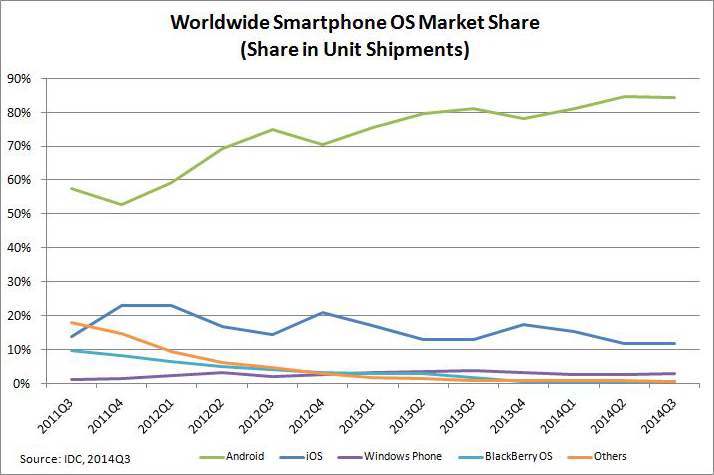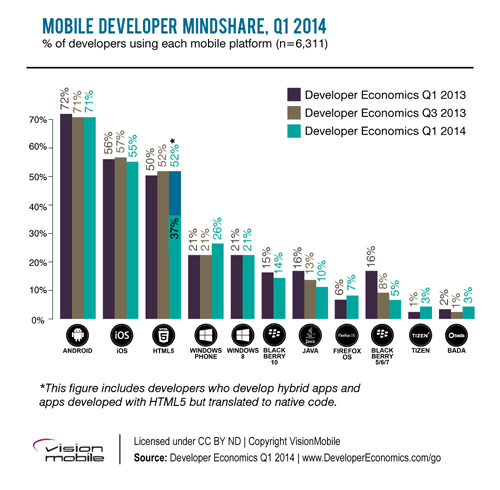It’s about time. Despite years of trying to make Windows Phone competitive with Apple’s iOS and Google’s Android, Microsoft may finally be willing to concede defeat.
Which, ironically, may be exactly what it needs to win.
According to Mary Jo Foley’s inside sources at Microsoft, the company is actively considering a “Plan B” by which it would “enable Android apps to run on its Windows and Windows Phone operating systems” for Windows 10. While it stops shy of supporting Android itself, this could be Microsoft’s best chance to rejuvenate its mobile fortunes after years of waste.
The Windows Rounding Error
For younger people, by which I mean anyone younger than 30, there has never been a time when Microsoft was anything more than the vendor of Windows, that operating system (OS) their parents used or that they were forced to use at work.
See also: 2015: The Year Of The Mobile Singularity
The under-30 demographic, after all, grew up with smartphones, which now dwarf PC shipments, and now dominate the way we go online, according to comScore.
In the global smartphone operating system market, Microsoft’s Windows is barely a rounding error, mustering just 2.9% market share, a drop from the same period in 2013 (3.6%), according to IDC:

Apple’s iOS also declined during the same period, but has managed to maintain a hefty share of mobile revenue even as its market share has slipped. The only way Microsoft has been eking out a mobile living is by shaking down Android OEMs for patent license fees.
That’s weak.
But it’s also a sign of just how desperate Microsoft is. At just over 40 years old, I grew up during the Microsoft decades, when Windows was so brazenly dominant that even U.S. antitrust regulators couldn’t shake Redmond’s grip on computing. But now? Microsoft is not only not in the game, it’s not even a substitute on the bench.
Microsoft Needs An App Lifeline
Meanwhile, Google’s Android has managed to come from nowhere and bury Apple’s early lead. The industry is now framed by the iOS/Android duopoly, and there’s little chance that Microsoft can break its way back in.
See also: Microsoft May Launch A New Browser That Supports Chrome Extensions
The reason, as VisionMobile analyst Andreas Pappas highlights, is developers. Apple and Google command 69% of developer loyalties (those using iOS or Android as their primary development target) between them:

Such loyalty shows up in the millions of apps that Android and iOS developers have written for these platforms. Windows Phone has 340,000 apps. While most of the apps written for these three platforms are not great, the perception and reality of Windows is that it’s an afterthought for most developers.
This makes it an unappetizing platform for consumers, despite being an excellent OS. I’ve spent weeks using it and really liked it. But I could never switch because of its apps gap, not to mention my indentured servitude to a rival app store.
Microsoft’s Android Moment
Which is one reason that Microsoft embracing Android would be a huge, disruptive move by the technology giant. Yes, Microsoft could continue to spend years trying to convince its CIO fans to embrace Windows Phone, but with the rising power of BYOD (bring your own device), this is looking increasingly unlikely to succeed.
Or Microsoft could continue with its “Plan A,” which, according to Foley, involves “moving to the Universal App model, which will enable developers to get closer to Microsoft’s long-standing write once/run on any Windows promise.”
See also: Big Data Will Get Even Bigger In 2015
The problem, however, is that this doesn’t really close the apps gap, as developers are less interested in desktop platforms and more so in mobile.
Microsoft’s mobile team should take its cue from Windows Azure, the cloud service that is looking increasingly competitive with Amazon Web Services. In an historically atypical move, Microsoft Azure has embraced popular open source alternatives to its own services for years, including Drupal, MongoDB and even Linux. Once Microsoft remembered it was a platform company, embracing the applications and infrastructure that developers wanted on that platform became an easy choice.
The same should be true of Windows Phone. If developers have decided to write Android apps, Microsoft should enable Android apps to run on Windows. It’s not about religion or politics: it’s about doing what is right for the customer.








